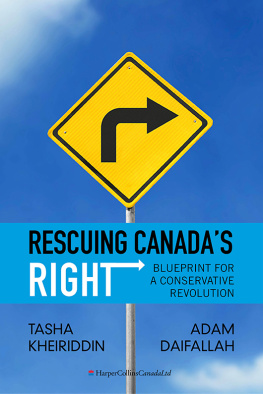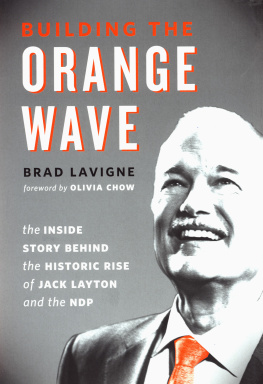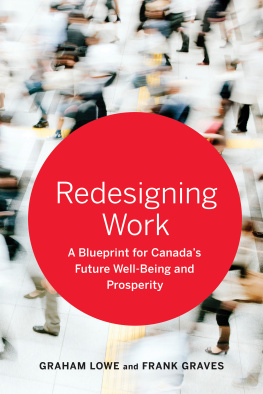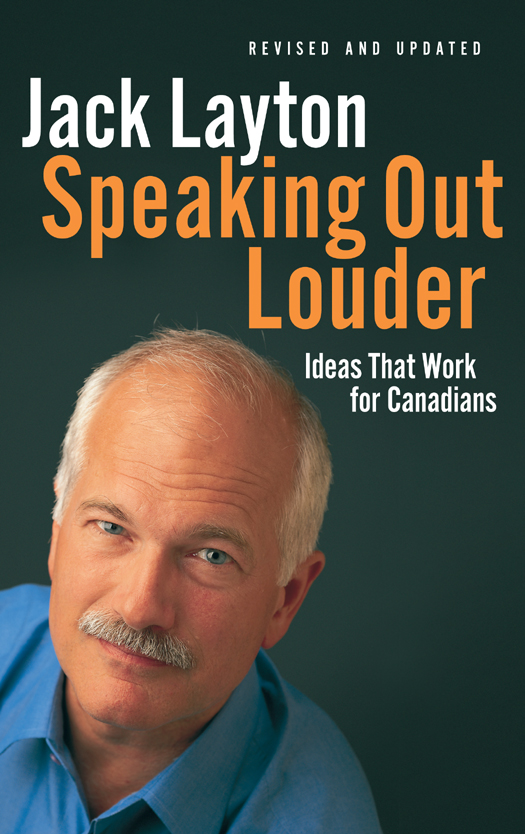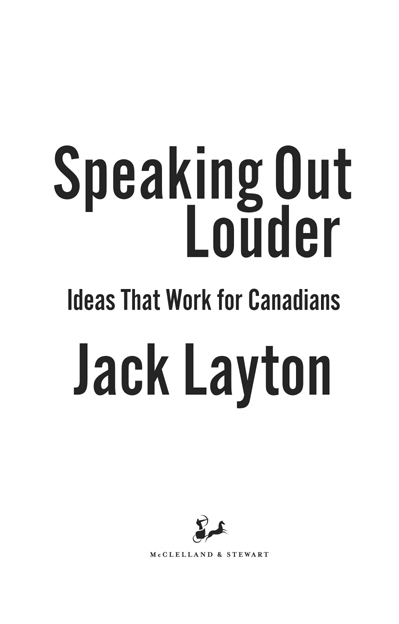Copyright 2006 by Jack Layton
Originally published by Key Porter Books as Speaking Out Loud in 2004 and as Speaking Out Louder (fully revised) in 2006.
This edition published by McClelland & Stewart in 2011.
All rights reserved. The use of any part of this publication reproduced, transmitted in any form or by any means, electronic, mechanical, photocopying, recording, or otherwise, or stored in a retrieval system, without the prior written consent of the publisher or, in case of photocopying or other reprographic copying, a licence from the Canadian Copyright Licensing Agency is an infringement of the copyright law.
Library and Archives Canada Cataloguing in Publication
Layton, Jack, 19502011
Speaking out louder : ideas that work for Canadians / Jack Layton.
Originally published: Toronto : Key Porter Books, 2006.
eISBN: 978-0-7710-4616-2
1. CanadaSocial conditions1991-. 2. CanadaEconomic conditions1991-. 3. CanadaEconomic policy. 4. CanadaPolitics and government19932006.
I. Title.
FC 635. L 39 2011 971.0648 C 2011-906240-2
We acknowledge the financial support of the Government of Canada through the Book Publishing Industry Development Program and that of the Government of Ontario through the Ontario Media Development Corporations Ontario Book Initiative. We further acknowledge the support of the Canada Council for the Arts and the Ontario Arts Council for our publishing program.
Cover photo by Alex Waterhouse-Hayward
Cover design by Ingrid Paulson and Martin Gould
McClelland & Stewart Ltd.
75 Sherbourne Street
Toronto, Ontario
M 5 A 2 P 9
www.mcclelland.com
v3.1
To Olivia Chow, and Sarah and Michael Layton.
And in memory of Dan Leckie and Robert Layton
If we do not change our direction, we are liable to end up where we are headed.
CHINESE PROVERB
Contents
Preface to the Revised Edition
Since writing Speaking Out Loud just over two years ago, much has changed in my life, in Canada, and in the world. Our world has been battered by both natural and political shock waves.
The battering continues. The images have seared scars onto our souls. I will never forget the faces of the tsunami aftermath. News reports and images were stunningly stark. Then, as part of the Canadian delegation visiting devastated areas, I gazed into the faces of those who had experienced violent, rapid, and catastrophic loss of their family and communities in Sri Lanka and Thailand.
I saw despair, determination, and hopeall in the worst of worlds. Old survivors stared at a middle distance, empty, hollow, deeply pained eyes. Adults looked at me with a grim, set-jaw focus as they rebuilt with whatever was available.
But the childrens faces were the most striking to methe ones set permanently in my memory. How could they be smiling? There was a hopefulness in those eyes that it seems that only children can muster in the face of such horror. Surrounded by the devastation of Amparas seaside fishing neighbourhoods, with a mass grave covered with fluttering white flags, one little boy looked up into our eyes and said: I lost my mother and my father too. Then, a smile as curiosity took over and he asked, almost cheerfully, Whats your name?
My heart was breaking as I gave the youngster my name, which he and his friends began to repeat, laughing at the funny sound of Jack as foreign to their ears as my skin colour was to their eyeseyes that had seen things a child should not have had to see. There and then, like many Canadians have already done, I made a commitment to do more personally and politically. Its time to extend the extraordinary outpouring of concern, solidarity, and generosity.
Something more was happening. The extraordinary outpouring of popular support for the tsunami-hit communities seemed to me to embody a message to world governments. The collective generosity of citizens for their fellows suggests that there are values that were tapped by the catastrophe. Theres no question that these are core Canadian values: lets ensure that people have the basic necessities of life, particularly when we have so much. But the global grassroots response tells us that these values are universal. I believe people were telling their governments, by their actions, that they wanted government policies and decisions to reflect these values. They were calling implicitly for new choices to be made in the pursuit of human security.
The huge waves and devastation on December 26, 2004 illustrated human vulnerability on a massive scale and in a dramatic, visible way. But human security is threatened daily because of poverty and related diseases. British PM Tony Blair captured this fact when he declared that Africa faces a tsunami a week from AIDS and other diseases. So why is there no similar response? Why are the human values that drove so many to give and help in response to the giant wave not propelling us and our governments to respond to the greater and just as real threats facing so many daily?
It is because of the choices that have been made by governments. What are these essential choices?
They have been rather starkly revealed in recent months. On the one hand there has been a rising global call to take on poverty around the world. At the same time, the most affluent nation has ramped up its military spending to unprecedented levels. These are choices being made on behalf of the worlds people by the governments that purport to represent them. In early 2005, weeks after the tsunami, a worldwide movement was launched called Make Poverty History. Nelson Mandela and those others involved were tapping the values that motivated the global response to the tsunami; the challenge is to keep up the momentum and to motivate lethargic or willfully blind governments to achieve the aspirations of the global family: human security for all by ending poverty globally.
A natural catastrophe reminded us that the earth is indeed a lifeboat. So we are faced with key choices and that we must work together in a climate of collaboration, nurtured by an aspiration to equality, fairness, and generosity. Ideas start with dreamssome little, some not so little. Dream no little dreams! Tommy Douglas, first leader of the New Democratic Party of Canada, tells us. Why do Canadians respond so well to such a call? Ive always believed that Canadians dreamed in big, full-colour panoramas. I also believed that the Canadian capacity to generate ideas that work for Canada and for the world was extraordinary, a conviction that caused me to put this book together in the first place.
On June 28, 2004, I became a Member of Parliament in a minority government headed by Liberal Paul Martin. I was re-elected January 23, 2006 in a second minority, this time headed by Conservative Stephen Harper. Over two million Canadians cast ballots for the NDP in 2004up one million from 2000and more than two and a half million chose our party in 2006, demonstrating their confidence in the party that I have had the privilege to lead since January 2003. NDP MP s have worked hard to earn the trust of so many, and were going to work even harder in the future. In Parliament, we try to do what Canadians want us to do. We have results to show from those efforts. Sure, were proud of what weve accomplished, but theres so much more to do.
Too often, however, Im reminded that converting good ideas into parliamentary action is far more difficult than it should be. This, in large part, can be attributed to the failure of some political leaders and parties to recognize certain realities. For instance, when Canadian voters elect a minority Parliament this can be an opportunity, not a problem. Prime Minister Martin appeared to view the minority government he led as a nagging problem, while I viewed it as a golden opportunity. Time will tell how Mr. Harper sees the minority he currently leads, although the first session was not auspicious. Government by ultimatum is how Ive described his approach. My way or the highway seems to be his message to the opposition parties, never mind that they have the majority of seats and votes!




